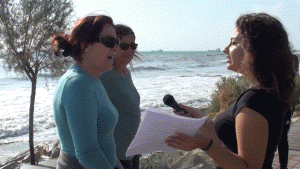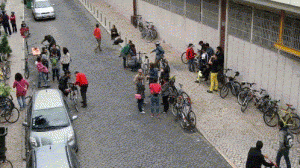Marching forward in 21st century, the world has been experiencing rapid and constant changes: one of them is the growing need for sustainable mobility, specially in cities. There for in the last decade European countries have been investigating and investing a lot in order to promote public transport and cycling.
Limassol and Lisbon are cities of Cyprus and Portugal, respectively, that intend to improve their sustainable mobility promoting cycling, and healthy lifestyles. By interviewing citizens in these two big conurbations, we realized how successful these cities have been to achieve the referred objectives.

Interviewing cyclists in Limassol
While being interviewed about the bike lanes network, the cyclists in Limassol claimed “… the use of the bikeways contributes highly for the reduction of air and noise pollution as well as to save and promote sustainable use of non-renewable natural resources … It also creates a great opportunity for the country´s economy to flourish by the reduced cost of fuels and by uplifting new kind of tourism in the island.” However, they agree, “There are several problems caused by the discontinuity of the network, the massive use of cycle paths from pedestrians and the illegal parking on the cycle path.”
On the other hand, drivers identify more advantages to the environment and more disadvantages in society. Nevertheless, they oppose to the idea of narrowing the roads to create bike lanes and argue cyclists do not respect traffic code, setting to danger those who use the roads.
Bus drivers regarding bus stops on the side of roads where there are bike lanes, reported this situation as a main problem.
Shop owners’ opinions differ: some argue the presence of the cycle path incited people to visit their stores, while some mention a decline in the number of customers due to the abolition of direct parking. More problems assign to the social dimension since sometimes cyclists hit people entering or leaving their store.
Wherefore, all groups of citizens interrogated in Limassol realize the contribution of bike lanes to a more environmental sustainable lifestyle. Notwithstanding, the biggest concern seems to lay down in the social dimension of bike lanes and especially the education and awareness of cyclists, drivers and citizens. It is important to notice that in Limassol the number of projects to promote cycling is not enough as the only event that is organized is a tour of the city, which happens often.
Nonetheless, recently, a law related to the bike lanes has been voted: drivers who park in bike lanes will be punished.

Cyclists near the Tagus River, Lisbon
Lisbon is one of the three finalists for the European Mobility Week Award 2015 organized by the European Commission. In the last few years, Lisbon has attended several initiatives and projects to boost cycling such as Projeto 189 – the pioneering effort of University of Lisbon that focuses on increasing the sustainable mobility; MUBi – an organization founded by urban cyclists to promote the bike as utility vehicle in the community in long term.
Furthermore, in 2009, the Group of Inte rministerial Work for the preparation of a National Plan of Promotion of the Bicycle and Other Gentle Ways of Transport was approved. It does lectures and workshops in schools and companies.
As succeeded in Limassol, to prove these initiatives’ efficiency we made a similar survey near Tagus River in Lisbon.
Here, one of the cyclists interviewed revealed, “It is a good place to cycle but there are problems. The responsible authorities must not only maintain the cycle lanes but also have to uplift its quality.
These bike lanes are not the real lanes but just a painted ground.” Other afirmed “The cycle lanes are very useful and satisfactory.”
On the contrary, a taxi driver claimed, “The number of accidents has increased since cyclists have the same regulations as cars. Most of them don’t know the road code. However, bike lanes are interrupted constantly and riders risk harming themselves. The municipality should create a special cycling license.” We also visited the Community Bicycle Workshop of Anjos and talked to a volunteer. “We repair bicycles and provide the knowledge for doing it to the owners and free materials and resources for interested. The service given is voluntary and unpaid.
Regarding bike lanes, he added, “Its conditions are unacceptable. There are several footpaths where bicycle lanes could be built.” Moreover, to understand the cycling in Lisbon and its impact on sustainable development, we interviewed Francisco Ferreira, former President of Quercus, the biggest Portuguese environmental organization, who declared “The environmental evaluation of an act of consumption does not concern only the characteristics of the acquired goods, but it can be fitted in a perspective where the dislocation for the purchase also will have to be incorporated. Therefore, the use of the bicycle can be a way to reduce the carbon footprint of a purchase. At the same time, if we use the bicycle to move from house to work, we are contributing globally to a more sustainable production.”
When questioned about the main obstacles against the achievement of a full sustainable mobility in the city, he revealed, “There are problems in the articulation of the public transport and in making it look as attractive as the automobile. The money invested is not enough yet.”
In the context of Limassol, people believe there are only benefits for the environment by using the bicycle whilst for the economy there are advantages and disadvantages. Citizens think it would be useful to have more of those projects in Limassol for them to be informed about the bike lanes, as there is a lack of projects promoting cycling.
In the Portuguese capital, some projects have been planned by the city council, including the building of bike lanes to connect the whole city as cyclists complain about its discontinuity and lack of maintenance, accusing authorities of not being aware of the problems cyclists face. Citizens in general point out the insecurity cyclists face and suggest the remodelling and a specific legislation for them.
However, inhabitants of both cities sounded determinate to fight for a change in the paradigm. After all, is not the bicycle the vehicle of a sustainable and innovative mentality?
YRE Portugal: Maria Carreira, Sharad Poudel, Martim Teixeira, Rita Costa,
YRE Cyprus: Kyriaki Hadjichambi, Katerina Papamiltiadous
_____________________________
Bibliographic References
http://www.euro.who.int/en/health-topics/environment-and-health/Transport-and-health/activities/safe-walking-and-cycling-in-urban-areas
We would like to thank Dr. Francisco Ferreira from Universidade Nova de Lisboa for his availability in answering to the questions that were asked for the realization of this article and to all the interviewed as well.




You must be logged in to post a comment.